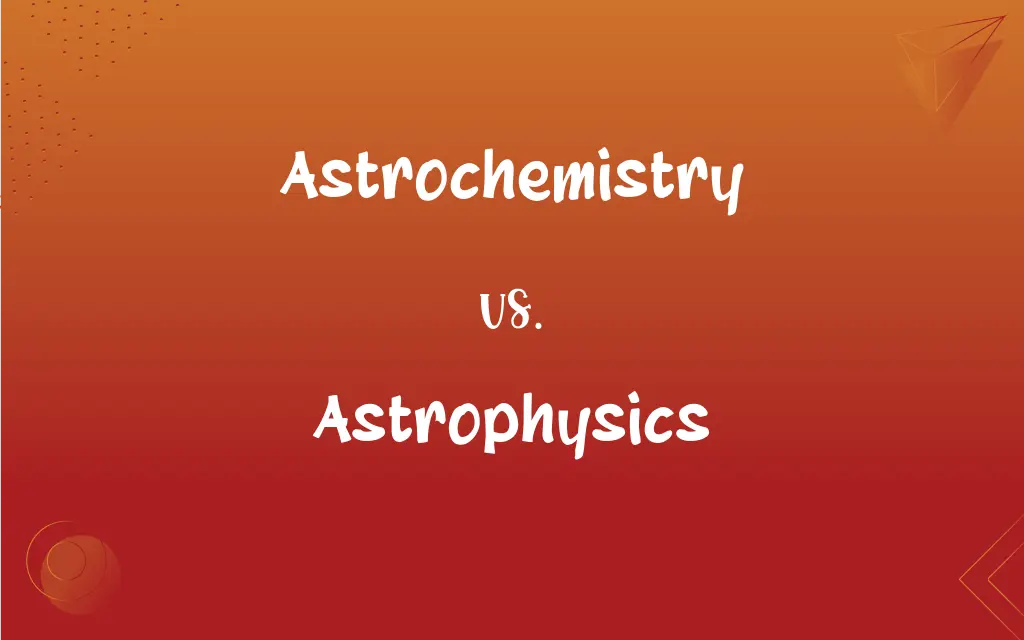Astrochemistry vs. Astrophysics: What's the Difference?
Edited by Harlon Moss || By Janet White || Updated on September 30, 2023
Astrochemistry studies chemical interactions in the universe, while Astrophysics explores physical properties and dynamics of celestial objects.

Key Differences
Astrochemistry and Astrophysics are significant branches of astronomy that delve deep into the understanding of the universe, but they focus on different aspects. Astrochemistry is the study of the abundance and reactions of chemical elements and molecules in the universe. It combines principles of chemistry and astronomy to understand the composition and chemical processes occurring in celestial bodies. In contrast, Astrophysics applies the principles of physics and mathematics to understand how stars, planets, and galaxies are formed, evolve, and end their existence.
Astrochemistry is crucial for exploring the molecular complexity of the cosmos. It aims to understand the chemical processes and reactions occurring in various astronomical environments, such as interstellar clouds, star-forming regions, and planetary atmospheres. On the other hand, Astrophysics seeks to reveal the fundamental nature and behavior of celestial objects and phenomena, focusing on the interactions, energy transformations, and forces at play in the universe.
In Astrochemistry, researchers use spectroscopy to identify chemical compounds in space and study their properties and reactions in varied environments. It provides insight into the chemical composition of celestial objects and the origins of chemical elements in the universe. Conversely, Astrophysics employs observational data and theoretical models to explore the structure, nature, and behavior of celestial bodies and the universe, including the study of light, energy, and the fundamental forces of nature.
Although both Astrochemistry and Astrophysics involve the exploration of celestial phenomena, they differ in their approaches and areas of focus. Astrochemistry emphasizes chemical interactions and compositions, revealing the cosmic dance of molecules and elements. Astrophysics, however, dives deep into the physical laws governing the universe, unfolding the intricacies of matter, energy, space, and time.
Comparison Chart
Focus
Chemical interactions and compositions in the universe.
Physical properties and dynamics of celestial objects.
ADVERTISEMENT
Methodologies
Uses spectroscopy to identify and study chemical compounds in space.
Employs observational data and theoretical models.
Objective
Understand the chemical processes and reactions in astronomical environments.
Understand the behavior and nature of celestial objects and phenomena.
Study Objects
Molecules, atoms, chemical reactions in space.
Stars, galaxies, planets, and overall structure of the universe.
Contributions
Provides insight into the chemical composition of celestial objects.
Reveals the physical laws and behaviors governing the universe.
Astrochemistry and Astrophysics Definitions
Astrochemistry
The science studying chemical elements and compounds in the universe.
Astrochemistry has revealed the presence of complex organic molecules in space.
ADVERTISEMENT
Astrophysics
Exploration of the physical properties and dynamics of objects in space.
Astrophysics enables us to explore the relationships between matter, energy, space, and time.
Astrochemistry
The examination of chemical abundance and reactions in space.
The discovery of water on Mars was a significant milestone in astrochemistry.
Astrophysics
The study of the forces, energy, and structure of the universe.
Through astrophysics, we gain insight into the structure and evolution of galaxies.
Astrochemistry
A study of molecular processes and interaction in the universe.
Through astrochemistry, scientists study the molecular origins of stars and planets.
Astrophysics
Investigation of the interactions and behavior of celestial objects.
Astrophysics has expanded our knowledge of the fundamental forces governing the universe.
Astrochemistry
A field combining principles of chemistry and astronomy to study celestial composition.
Astrochemistry explores the chemical reactions occurring within interstellar clouds.
Astrophysics
The branch of astronomy studying the physical nature of celestial bodies and the universe.
Astrophysics seeks to understand the lifecycle of stars.
Astrochemistry
Investigation of the chemical structure of celestial bodies.
Astrochemistry contributes to our understanding of the chemical makeup of comets.
Astrophysics
The application of physical principles to celestial phenomena.
The study of black holes is a fascinating aspect of astrophysics.
Astrochemistry
The chemistry of stars and interstellar space.
Astrophysics
The branch of applied physics that deals with astronomical phenomena.
Astrochemistry
The study of the chemical composition of stars and outer space
Astrophysics
The branch of astronomy or physics that deals with the physical properties of celestial bodies and with the interaction between matter and radiation in celestial bodies and in the space between them.
Astrochemistry
The branch of science involving astronomy and chemistry which studies the chemical composition, chemical reactions, and evolution of matter in outer space.
Astrophysics
The concerned with the physical and chemical properties of celestial bodies.
Astrophysics
The science treating of the physical characteristics of the stars and other heavenly bodies, their chemical constitution, light, heat, atmospheres, etc. It is a branch of astronomy.
Astrophysics
The branch of astronomy concerned with the physical and chemical properties of celestial bodies
FAQs
Does astrophysics involve the study of the universe's structure?
Yes, astrophysics explores the physical properties and dynamics of celestial objects and the universe.
Can astrochemistry provide insights into the origins of life?
Yes, astrochemistry can provide clues about the chemical precursors to life.
Is astrochemistry focused on the chemical composition of celestial bodies?
Yes, astrochemistry studies the chemical interactions and compositions in the universe.
Is astrochemistry concerned with the reaction mechanisms in space?
Yes, understanding reaction mechanisms in different astronomical environments is a key focus of astrochemistry.
Do astrochemists use spectroscopy in their research?
Yes, spectroscopy is a fundamental tool in astrochemistry.
Does astrophysics explore the fundamental forces of the universe?
Indeed, one of the goals of astrophysics is to understand the fundamental forces governing the universe.
Is exploring the lifecycle of stars a domain of astrophysics?
Yes, understanding the lifecycle of stars is a central part of astrophysics.
Does astrophysics employ mathematical models?
Yes, astrophysics extensively uses mathematical models to understand celestial phenomena.
Can astrochemistry reveal the presence of organic molecules in space?
Absolutely, astrochemistry has identified various organic molecules in space.
Does astrochemistry study the abundance of elements in the universe?
Yes, studying the abundance of different elements in the universe is a crucial aspect of astrochemistry.
Is the study of black holes a part of astrophysics?
Yes, studying black holes is a crucial aspect of astrophysics.
Can astrophysics help in understanding the evolution of galaxies?
Yes, astrophysics provides insights into the formation and evolution of galaxies.
Does astrochemistry involve the study of interstellar clouds?
Yes, interstellar clouds are significant subjects of study in astrochemistry.
Can astrochemistry help in identifying potential life-supporting environments in the universe?
Yes, by studying chemical compositions and reactions, astrochemistry can identify environments that may support life.
Is the study of energy transformations part of astrophysics?
Yes, exploring energy transformations is a fundamental component of astrophysics.
About Author
Written by
Janet WhiteJanet White has been an esteemed writer and blogger for Difference Wiki. Holding a Master's degree in Science and Medical Journalism from the prestigious Boston University, she has consistently demonstrated her expertise and passion for her field. When she's not immersed in her work, Janet relishes her time exercising, delving into a good book, and cherishing moments with friends and family.
Edited by
Harlon MossHarlon is a seasoned quality moderator and accomplished content writer for Difference Wiki. An alumnus of the prestigious University of California, he earned his degree in Computer Science. Leveraging his academic background, Harlon brings a meticulous and informed perspective to his work, ensuring content accuracy and excellence.































































